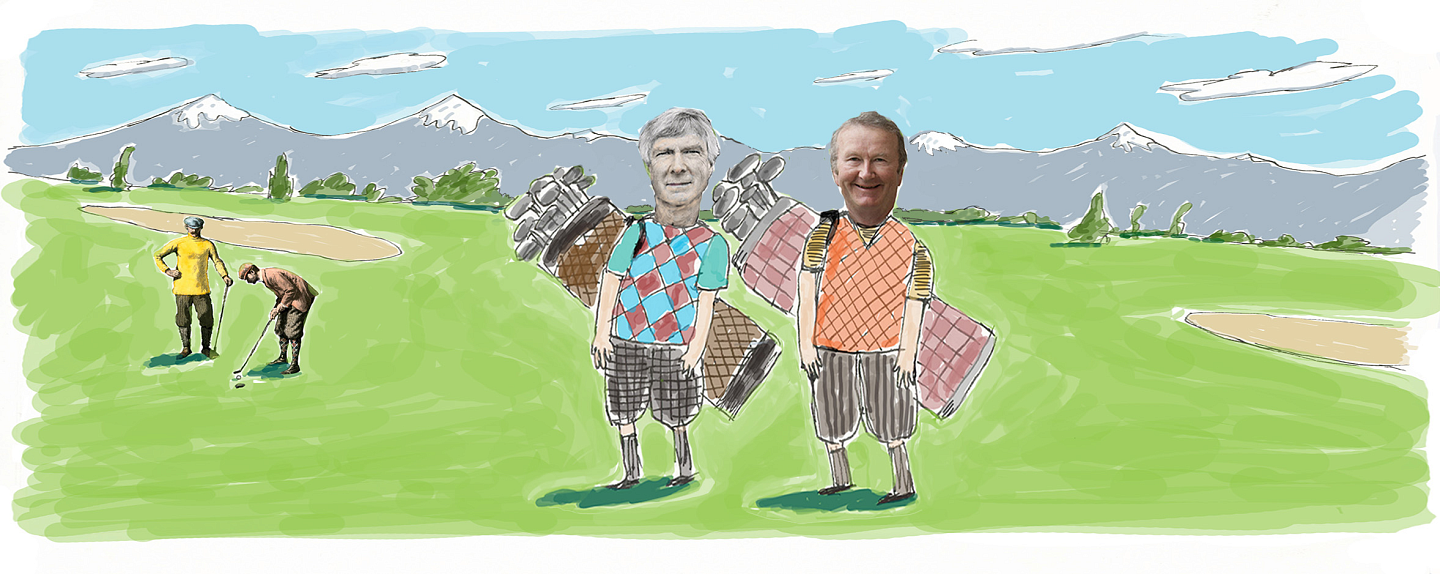
Duck Tale: John Frohnmayer and the Long Game in Golf, Life
What lessons could a golf caddy learn? You don't have to play the game to see what it reveals of human nature
By John Frohnmayer • Illustration by Gary Clement • April 14, 2020
3 min read
Author John Frohnmayer, JD ’72, based Carrying the Clubs: What Golf Teaches Us About Ethics on childhood memories and the stories he and his brother—the late Dave Frohnmayer, university president from 1994 to 2009—brought home for discussion at the family dinner table when they caddied as kids. He played golf for Medford High School and “used to know where the ball was going,” he says. “No more.” Excerpts include:
The driving vacation of the 1950s was a test of whether the kids in the car could drive their parents nuts. In 1953, all six of us drove as far east as Detroit, Michigan. I had to sit in the middle of the back seat (the least favored position) as a buffer between Dave and Phil. All Dave (the older) had to do was sing a few bars of “Slow boat, oh, slow boat,” and Phil would fly into a rage, fists gyrating and blows landing mostly on me.
As a subordinate sibling, you get experienced parents who are less likely to hover. You get siblings to admire, like my sister, Mira, who was so funny, so gifted in music and sports, and my brother, Dave, who could out read, outthink, and outtalk all of us. Persuasion was highly prized, as was the luxury of being persuadable.
A major conflict between golf and culture arose on a family trip to Victoria, British Columbia. We were staying in the lofty, snooty, and elegant Empress Hotel, but we had packed our golf clubs. Dad, Mira, Dave, and I went to play one of the many wonderful courses there not to return in time for high tea, and was Mother annoyed. Totally angry to tears. High tea at the Empress was a big deal with a string quartet playing Vivaldi and Bach, pastries and cakes of indescribable lushness, and of course, tea made as only the English can make it. It was one of the few times I saw her that mad.
The Greek philosopher Heraclitus tells us that a man’s character is his fate, so let’s talk cheating. I was a naïve kid, but I knew when adults were cheating. One man would mark his ball in front rather than in back. When he replaced the ball, it was as much as six inches ahead of the coin. He laughed to me that if he could mark it a couple more times, it would be a gimme. A proud cheater.
I suspect there was some price to be paid for cheating, primarily that others wouldn’t want to play with that person, but I never saw that part of the dynamic. I did see that the other players in the group would not call out a cheater. I was left to ponder whether cheating was the norm, whether it mattered, and what these guys did in the other parts of their lives—in business, with their wives and their friends.
There is something called the “Mama rule.” If you are afraid to tell it to Mama, you shouldn’t be doing it. Good advice. I took the cheating I saw home for discussion at the dinner table and got a dose of old-time religion from my mother. Dad too. We didn’t cheat, didn’t lie. Those were rules to live by, and they weren’t negotiable.
We educate ourselves, we learn from experience, we practice what we want to become good at, and yet we take advice from friends or even strangers, and it costs us. Butch Harmon, famous coach of Tiger Woods, Phil Mickelson, and Greg Norman, says, “Taking advice from another player is the surest way to get worse at golf.”
John Frohnmayer, JD ’72, a retired attorney, has also written John Frohnmayer, JD ’72, a retired attorney, has also written Leaving Town Alive: Confessions of an Arts Warrior and Out of Tune: Listening to the First Amendment, among other books. Visit johnfrohnmayer.com for more information. He will be recording a lecture "What is the Role of Ethics in a Post-Truth World" that will be available for streaming on April 30 on the OHC's YouTube channel. The electronic revolution gave promise of access to a world of useful information, but we seem to have found ourselves as a society with wildly different views of the truth. We are siloed and we are mad. How can we maintain our democracy when we can’t agree on a common set of facts? All citizens, but particularly lawyers, have a vital role to play here.

